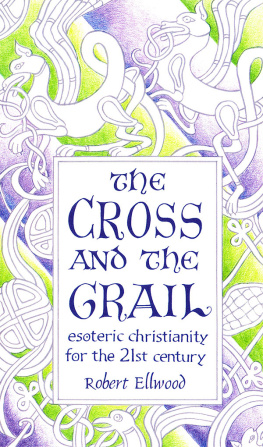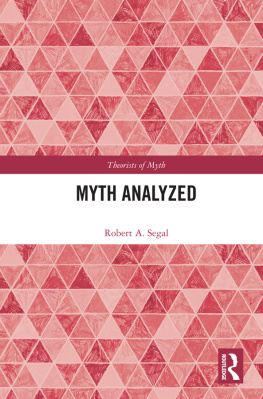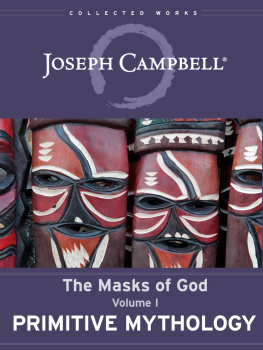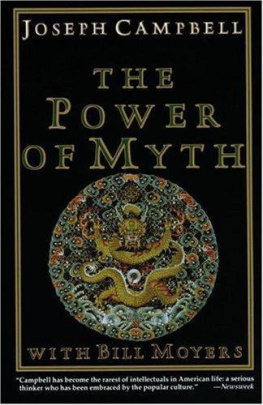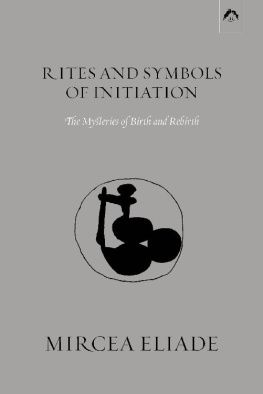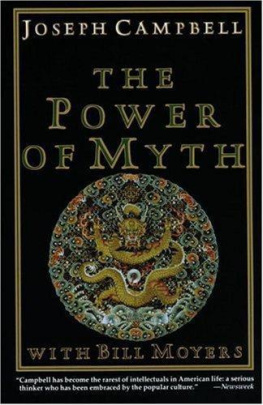The Politics of Myth
SUNY series, Issues in the Study of Religion
Bryan Rennie, Editor
The Politics of Myth
A Study of C. G. Jung, Mircea Eliade, and Joseph Campbell
Robert Ellwood
State University of New York Press
Published by
State University of New York Press, Albany
1999 State University of New York
All rights reserved
Printed in the United States of America
No part of this book may be used or reproduced in any manner whatsoever without written permission.
No part of this book may be stored in a retrieval system or transmitted in any form or by any means including electronic, electrostatic, magnetic tape, mechanical, photocopying, recording, or otherwise without the prior permission in writing of the publisher.
For information, address
State University of New York Press,
State University Plaza, Albany, N.Y. 12246
Production by Dale Cotton
Marketing by Anne M. Valentine
Acknowledgment
Portions of this book previously appeared in Robert Ellwood, "Why Are Mythologists Political Reactionaries?" published in Jacob Neusner, ed., Religion and the Social Order: What Kinds of LessonsDoes History Teach? 1994 by the University of South Florida and published by Scholars Press for the University of South Florida, the University of Rochester, and Saint Louis University, and reprinted here by kind permission of Scholars Press, Atlanta.
Library of Congress Cataloging in Publication Data
Ellwood, Robert S., 1933
The politics of myth : a study of C. G. Jung, Mircea Eliade, and Joseph Campbell / Robert Ellwood.
p. cm. (SUNY series, issues in the study of religion)
Includes index.
ISBN 0791443051
(hc. : alk. paper). ISBN 079144306X
(pbk. : alk. paper)
1. Eliade, Mircea, 1907Views on politics. 2. Campbell, Joseph, 1904Views on politics. 3. Jung, C. G. (Carl Gustav), 18751961Views on politics. 4. MythologistsAttitudesHistory20th century.
I. Title. II. Series.
BL303.5.E44 1999
291.1'3'0922dc21
9854277
CIP
Contents
Preface
Amid the horrors of world war and the exponential expansion of technologies and economies, the mid-twentieth century saw also a late modern upsurge of popular and academic interest in mythology. Three persons were primarily associated with this development: the analytic psychologist C. G. Jung, the historian of religion Mircea Eliade, and the widely read public mythologist Joseph Campbell. The interest was not merely aesthetic: these interpreters of ancient myth said much to lead their public to believe that a rediscovery of meaning in myth could contribute to solving the personal and social problems of those tumultuous times. At the same time, all three mythologists have at times been associated with the politics of the extreme right, even, according to some charges, with sympathy for fascism and anti-Semitism. The present book refers to these serious accusations, while chiefly endeavoring to extract the political and social philosophy presented explicitly and implicitly in the entire lifework and published corpus of the three persons.
The introductory chapter, "Myth, Gnosis, and Modernity," treats of the nature of "modern" belief in progress and the unity of knowledge. It portrays the mythological movement as, like fascism and communism, representing an extreme case of modernism even as it was highly critical of many aspects of it: of materialism, "mass man," and the uprooting of traditional societies. For the modern mythologists could only critique the modern from out of the context of modern sciences, academic insitutions, and means of communication. The ambivalence of their "reaction" and their "gnosticism "seeking a "hidden" wisdom in the remote pastis sought for, as is the relation of modern mythology to romanticism and German "volkish" thought.
C. G. Jung presents a paradigmatic case of this paradox, for though he was a modern medical doctor he came increasingly to believe that his patientsand the modern world generallyneeded to get in touch with the "archetypal" powers that lay beneath its rational surface, powers both individual and collective. It is here that Jung came dangerously close to enthusiasm for the German National Socialist revolution. In the end, though, the political stance of this difficult and sometimes contradictory thinker was closer to Burkean conservatism than to fascism.
The Romanian Mircea Eliade, a brilliant young intellectual in his homeland in the 1930s, and for a time an admirer of its fascist Iron Guard, suffered exile and a radical disjuncture in his life after 1945. Despite the early context, in the end it was the experience of exile that shaped what there was of political thought in Eliade: it gave him the freedom to be nostalgic for the unities of the distant past, while allowing him to see the sacred in the secular of the modern world in diverse places, and to appreciate guardedly the kind of insitutions he found in his adopted homeland, the United States.
Joseph Campbell, the only of the three born in America, came to extol the heroic radical individualism he perceived in the American past and its traditions. A student in Germany during the Weimar period, he absorbed the influence of such thinkers and writers of that era as Spengler, Frobenius, and Mann, as well as the psychoanalysts Freud and Jung, with their pessimistic view of the future of civilization as the modern world knew it. Like the other two, while supporting the political right he chiefly saw the saving of the world not in "collective" insitutions, but in the transformation of individuals with the help of the power of myth.
The book's conclusion points to the way in which the whole concept of myth which underlay the work of these three mythologists is a modern consruct. We can, it will be said, certainly listen to their wisdom, but we need not hold that it contains a unique "gnosis" that will save us from the obligation to chart our own human future.
It is important to make clear what the book is and is not about. The Politics of Myth is notprimarily an assessment of charges that Jung, Eliade, and Campbell were sympathizers with, and involved in, Nazism, fascism, or anti-Semitism. To deal with all the charges that have been made would require book-length studies in themselves, and that is not the task to which I have set myself. Rather, my real purpose is to discuss somewhat more abstractly the political philosophy that seems to emerge from the published writings of the three on mythology; I view the aforementioned inflammatory charges essentially as matters that must be faced and dealt with in the course of proceeding on to the real agenda. Thus I do not claim that my treatment of those issues is exhaustive or final; what I hope to do, at best, is to put the 1930s and 1940s in the context of each man's total life and work, and see where that leads. In the course of this project it will be necessary to confront the difficult and often highly charged issue of asking precisely in what way are such accusations, and evidence, importantas they certainly areto assessing the overall work, even the overall political philosophy, of any intellectual figure, including Jung, Eliade, and Campbell.
A task like this involves careful definitions of terms. anti-Semitism, for example, cannot be imputed to one who simply differs theologically with Judaism in the same way that a Catholic might differ with a Baptist, or a Christian or Jew with a Buddhist. The pejorative label antiSemitic is rightly used when it is clear that the feeling of difference extends to Jews as persons as well as to their supposed beliefs: when Jews appear to be held in some generic sense to be unchangeably different psychologically and even biologically from others, so that they could never "fit in" to the rest of a society, and their influence and even mere presence is therefore destructive to the unity of society. This anti-Semitic way of thinking involves stereotyping in terms of a generic quality that all Jews, regardless of individual differences, are supposed to have. Therefore the anti-Semite presumes that his antipathy toward Jews requires wordsand actionsthat are directed toward Jews as a whole.


